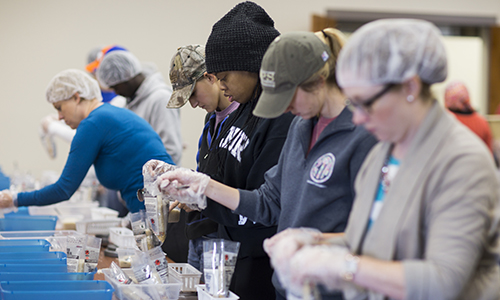UF/IFAS Divisions, Schools, and Departments
Research
The UF/IFAS research mission is to invent, discover, and develop knowledge to enhance the agricultural and natural resources of Florida. Research is supported by state and federally-appropriated funds and supplemented by grants and contracts.
The Florida Agricultural Experiment Station administers and supports research programs in UF/IFAS with 12 Research and Education Centers around the state. The research program was created in 1887 by federal legislation known as the Hatch Act - a follow-up to the 1862 Morrill Act that established U.S. land-grant universities.
- For more information, visit the UF/IFAS Research Website
Extension
The 1914 Smith-Lever Act provided federal support for land-grant institutions to offer educational programs to enhance the application of useful and practical information beyond their campuses through cooperative extension efforts with states and local communities.
UF/IFAS Extension provides Floridians with life-long learning programs in cooperation with county government, the United States Department of Agriculture, and Florida A&M University. The educational programs offered in each county respond to the local needs of residents, schools, regulatory agencies, community organizations, and industry.
UF/IFAS Extension programs promote:
- sustainable agriculture
- environmental stewardship
- financial literacy
- food nutrition and safety
- consumer and parenting skills
Extension programs also provide leadership opportunities for youth through programs in areas, such as science, technology, engineering, and math (STEM), entrepreneurship, and core life skills through Florida 4-H.
Solutions for Your Life is the official website of UF/IFAS Extension, making UF/IFAS faculty expertise available online under categories, such as lawn and garden care, family life and consumer choices, agriculture, community development, the environment, and youth development.
Ask IFAS is the UF/IFAS Extension library of science-based publications. Got a question? Ask IFAS!
- Want to see Extension helps each county in Florida? Read the most recent County Economic Impact Reports.
College of Agricultural and Life Sciences
The College of Agricultural and Life Sciences (CALS) offers students an education that results in knowledge and skills for employment, productive citizenship, and lifelong learning. With more than 20 undergraduate majors, the college is an educational leader in the areas of food, agriculture, natural resources, and life sciences as they relate to human resources, the environment, and communities. Graduate degrees are offered in every department and school.
Known for its student-centered focus, the college prides itself on educating society-ready graduates. In addition to the Gainesville campus programs, the college offers baccalaureate degrees, professional graduate degrees, and teacher certification courses at selected UF/IFAS Research and Education Centers. Online education courses, degree programs, and certificates are also offered.
Statewide Undergraduate Programs
Recognizing the specialized needs of nontraditional students, CALS established Bachelor of Science degree programs at UF/IFAS Research and Education Centers in Apopka, Fort Lauderdale, Fort Pierce, Milton, and Plant City. Degree programs include agricultural education, geomatics, plant sciences, and natural resource conservation. Students must have an associate’s degree to enter these programs, which are partnerships with local community colleges and our sister state universities. Two Bachelor of Science programs (microbiology and cell science, and interdisciplinary studies - environmental management in agriculture and natural resources) are now offered through distance education.
College of Veterinary Medicine
Ranked #9 among veterinary medical colleges nationwide by U.S. News & World Report, UF has Florida’s only College of Veterinary Medicine, teaching the veterinarians of the future and provide leading-edge care to animal patients from throughout the Southeast through the UF Veterinary Hospitals. Our programs in biomedical research advance the science of animal, human and environmental health.

On the CALS Day of Service, CALS students packaged more than 20,000 meals to feed others in developing countries.
Schools and Departments
- Agricultural and Biological Engineering
- Agricultural Education and Communication
- Agronomy
- Animal Sciences
- College of Agricultural and Life Sciences
- College of Veterinary Medicine
- Entomology and Nematology
- Environmental Horticulture
- Family, Youth and Community Sciences
- Food and Resource Economics
- Food Science and Human Nutrition
- Horticultural Sciences
- Microbiology and Cell Science
- Plant Pathology
- School of Forest, Fisheries, and Geomatics Sciences
- School of Natural Resources and Environment
- Soil, Water, and Ecosystem Sciences
- Wildlife Ecology and Conservation
